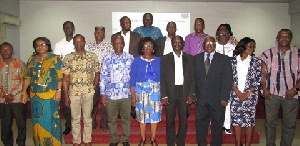 Principals and Vice Principals of Colleges of Education who participated in the training
Principals and Vice Principals of Colleges of Education who participated in the training
Principals, Vice Principals and Tutors of Colleges of Education (CoE) across the country, have been coached on the National School Partnership Policy (NSPP), which seeks to create a collaboration between Teacher Education Institutions (TEIs) and Basic Schools.
The policy focuses on providing opportunities to support teaching and mentorship as part of teacher preparation to equip Student Teachers with the requisite competencies to enable them to become qualified, effective and skilled professional teachers.
The CoE Authorities and Tutors were schooled on the new Bachelor of Education (B. Ed) Curriculum and the School Partnership; Effective School Partnership for quality practicum; and enhancing the capacity of District stakeholders to ensure improved teacher trainees practicum.
The training, which was organised in Accra by Transforming Teacher Education and Learning (T-TEL) in Ghana also focused on: The National School Partnership Policy; Principals and the School Partnership Policy.
At the end of the tutelage the CoE Authorities are expected to scrutinize the Memorandum of Understanding, which would constitute a partnership agreement for the purpose of organizing Supported Teaching in Schools (STS) as part of the preparation of Student-Teachers.
Professor Jophus Anamoah-Mensah, T-TEL Key Adviser – Curriculum and Teacher Education Reforms, explained that Ghana’s education landscape has been experiencing a set of ambitious and wide ranging reforms.
He said the Teacher Education Reforms (TER) in particular was designed to ensure that the country’s classrooms were staffed with skilled, trained and motivated teachers.
Prof Anamoah-Mensah who is a former Vice-Chancellor, University of Education, Winneba (UEW), said a key pillar of the TER was the shift from Diploma in Basic Education to a new four-year Bachelor of Education (B. Ed), Degree in Basic Education.
He said the curriculum for the new Basic Education Degree provided Ghana’s Teachers with the range of practical competences, skills, knowledge and values to deliver high-quality education.
He identified as essential pre-requisite for effective delivery of the new B. Ed programme, which hinged on strong and mutually beneficial partnerships between basic schools and Teacher Education Institutions (TEIs).
“Practical teaching experience forms an essential element of the new B. Ed. Degree programme and plays a major role across all four years of the curriculum delivery.
“This teaching experience relies on the existence of partnerships, overseen and mandated by the Ghana Education Service and the National Council for Tertiary Education under the auspices of the Ministry of Education,” Prof Anamoah-Mensah said.
He explained that, Government envisaged that these partner schools working in collaboration with TEIs, became the centres of excellence in driving the educational reforms across the basic school system.
He said it was mandated that these partner schools practically demonstrate how their teachers were exhibiting the competences outlined in the National Teachers’ Standards (NTS), exhibit mastery in implementing the new Basic Education Curriculum and improving learning outcomes – particularly in literacy and numeracy.
Prof Anamoah-Mensah noted that the National Teacher Education Curriculum Framework was designed to enable Student-Teachers to develop and apply the professional values and attitudes, knowledge and practices, so that they were competent to teach by the end of their training and able to demonstrate that they met the Teachers’ Standards in a manner appropriate to a beginning teacher.
Madam Margaret Okai, Acting Director, Basic Education Division of the GES, explained that the school partnership policy had been developed to guide the relationship between CoE and the partner Schools to improve supported teaching in Schools and the delivery of the new curriculum.
The Acting Director whose speech was read on her behalf noted that the overall goal of the education reforms was to train teachers to have the requisite skills, knowledge, and essential attributes for nurturing honest, creative and responsible citizens in the basic schools.